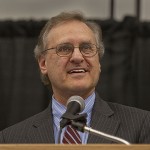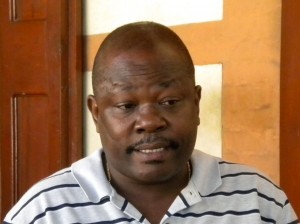Tag: mario joseph
In the News: Haitian lawyer accuses Montreal mayor Coderre of lying about Aristide ’04 ouster
by Andy Blatchford, with files from Associated Press. Originally posted at The Prince George Citizen
 MONTREAL – A prominent Haitian human-rights lawyer is calling on former federal cabinet minister Denis Coderre to apologize for allegedly lying about Canada’s involvement in the ouster of the Caribbean nation’s president 10 years ago.
MONTREAL – A prominent Haitian human-rights lawyer is calling on former federal cabinet minister Denis Coderre to apologize for allegedly lying about Canada’s involvement in the ouster of the Caribbean nation’s president 10 years ago.
Attorney Mario Joseph made the request Thursday during a visit to Montreal that coincided with the anniversary of Jean-Bertrand Aristide’s removal from office on Feb. 29, 2004.
At the time of Aristide’s expulsion, Coderre was the Liberal minister responsible for French-speaking countries such as Haiti.
Coderre, who was elected mayor of Montreal last November, says he has nothing to apologize for.
Joseph, who has represented the ex-president, alleged that Coderre lied in the days before Aristide’s removal from office when he said Ottawa did not want the Haitian leader to leave.
Haiti: The Coup D’etat 10 Years Later
Here are videos of the recent THAC event involving Melanie Newton and Mario Joseph.
Thank you to Pance Stojkovski for filming the event and making it available online.
In the News: Secrecy shrouds Canada’s role in Aristide’s ouster from Haiti
by Sue Montgomery. Originally printed in the Montreal Gazette February 28, 2014
MONTREAL — Ten years after Haiti’s first democratically elected president was removed from his country in the middle of the night and dumped in Africa, Canada’s role — and that of Montreal’s current mayor — has been shrouded in secrecy.
 Jean-Bertrand Aristide, the former priest from Haiti’s slums who is reviled by the elite minority and revered by the poor masses, claims to this day he was blindfolded and forced to sign a letter of resignation before being airlifted out and dropped in the Central African Republic.
Jean-Bertrand Aristide, the former priest from Haiti’s slums who is reviled by the elite minority and revered by the poor masses, claims to this day he was blindfolded and forced to sign a letter of resignation before being airlifted out and dropped in the Central African Republic.
The United States, Canada and France all claim he left voluntarily. They say they told Aristide that no one would come to help him — despite the trio’s signed commitment just four years earlier to do so — and that he, his family and supporters would be killed.
“In some ways, the competing stories are a distinction without a difference,” says Brian Concannon, a lawyer with the Boston-based Institute for Justice and Democracy in Haiti. “It is hard to say that in that situation he had a meaningful choice.”
It was another blow to the poorest country in the Western Hemisphere — made destitute by two centuries of racism, greed, revenge and a series of inept and corrupt governments backed by the United States. The Caribbean nation, which shares an island with the better-off Dominican Republic, has had 22 constitutions since winning its freedom in 1804 and lived through 32 coups — 33, if one counts the 2004 ouster of Aristide.
Now, Haitians want an apology from Canada, and particularly Montreal Mayor Denis Coderre.
Continue reading In the News: Secrecy shrouds Canada’s role in Aristide’s ouster from Haiti
In the News: Stephen Lewis says United Nations must be accountable for cholera in Haiti
by Roger Annis. Originally posted on rabble.ca

Stephen Lewis, a former Canadian ambassador to the United Nations who has also served at the world agency in several other prominent postings, says the international organization must accept responsibility for the cholera epidemic that broke out in Haiti in October 2010. He says he supports the legal action against the UN that was formally launched in New York City on October 9 on behalf of the victims of the epidemic.
Lewis spelled out strongly-held views in a nine-minute interview on the national, Saturday morning newsmagazine of CBC Radio One, Day 6 on October 12.
The CBC host began the interview by asking Lewis whether he supports the action. He replied, “I do. I think it is unequivocal, the responsibility of the United Nations for the cholera outbreak.”
Lewis dismissed suggestions that definitive proof of the origin of Haiti’s cholera epidemic has not been established. The disease was not present in modern Haiti before October 2010. The epidemic, he said, “has been traced definitively to the Nepalese peacekeeping force” of the UN military mission in Haiti termed MINUSTAH.
Even the UN’s own study on the matter, he said, “came within a hair’s breath of saying ‘we were responsible’, and in fact, the independent investigations by scientists show there is no question of the origin of the cholera”.
In the News: A Hero in Haiti
by Pooja Bhatia. Originally posted at ozy.com

To know Mario Joseph is to wait for Mario Joseph. You will wait for him to return from a last-minute hearing, to stop barking into one of his two mobile phones, to wrap up a meeting that started an hour late. And you will wait because Joseph, managing attorney at the NGO Bureau des Avocats Internationaux, is the best human rights lawyer in Haiti, a country where human rights are honored mostly in the breach. From dawn till dusk, clients gather on his office’s bougainvillea-laced terrace: brave women going after rapists, homeless Haitians evicted from post-quake tent camps, cholera victims seeking reparations.
Joseph’s eyes are often red-rimmed from lack of sleep, but his suits are sharp, his ties are sumptuous and his shoes and fingernails are buffed till they shine. With his percussive Creole and typically stern countenance, Joseph can be intimidating. It’s easy to forget that he was raised in rural poverty by a single mother who couldn’t read, and that he managed to get a law degree only through a series of flukes and his own determination. If fate had had its way, Joseph would have been like the millions of Haitians who never attend school, never see a doctor and live on less than $2 per day.
